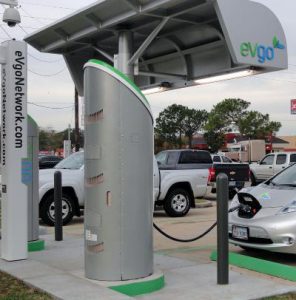One issue remains at the heart of whether or not people will finally embrace electric vehicles — range. The price of EVs is another big reason, but we can expect that to come down as technology is mass-produced, as is the story of just about every new technology that emerges. Range, on the other hand, persistently worries drivers.
Nowhere is range more important than when you are driving on the highway. For many, using a highway means you are traveling some distance, possibly as many as 100 miles or more in a single day. There are many in America who regularly traverse greater distances in a single day. This raises the question – are electric cars good for highway driving? Are they up to the challenge? In this article, I will explore these very questions in more detail. However the ‘TL;DR’ summary is:
There’s no physical limitation that make EVs “unsuitable” for highway driving. The main issue is practicality: highway speeds mean that large distances are covered, leading to range anxiety with more electric cars.
What’s the problem?
The range of electric cars seems to be going up all the time. Companies like Tesla appear to be leading the way with new models whose range stretches up to 379 miles on the new long-range Model S and Model X vehicles. With this kind of available range, can there be any question as to the viability of EVs on the highway?
The fact remains that the official range of the electric vehicle — usually the one rated by the EPA — does not give you the full picture. In May 20202, Car and Driver did research into how driving at speed continuously over some distance impacts the range of electric vehicles. I’ll cover that in more detail below.
Besides range, there are others who wonder about charging and safety when it comes to EVs and highway driving. These are further factors I will explore in this article. Many of the problems I describe today apply specifically to highway driving and not city driving, because the EV, in truth, is currently best-suited to city driving.
With the technology in its current state, EVs gain an advantage in the city which is the ability to maintain low power output while also reclaiming power through systems like regenerative braking. Regular internal-combustion-engine cars are unable to do this, since driving in low gears and regular idling are conditions in which much gas is wasted, and fast. On the highway, however, it’s a different story for EVs.
Electric Vehicles on the Highway: Range

The range of an electric car depends entirely on the battery and how efficiently the power is used for the car’s propulsion and other systems. The Nissan Leaf, for instance, carries a 30kWh battery that has a range of 155 miles. A long-range Tesla Model S, on the other hand, carries a 90kWh battery that can travel up to 346 miles on a single charge.
These are ratings issued by the companies themselves, usually from EPA-conducted range tests. They usually represent a combined figure based on city and highway driving, much the same way that fuel consumption is calculated. Car and Driver did a highway-specific test, however, and found that many cars when travelling at a consistent speed of 75mph over a long distance fell short of their EPA rating. In fact, of the 12 cars tested, not one reached its designated range limit when traveling at speed.
This presents a problem to those who want to use their electric vehicle on the highway. It means that the distances they want to cover might not be achievable despite what the advertised range of the car is. In the test done by Car and Driver, the best performer was the 2019 Audi e-tron, which achieved 190 miles of its reported 204-mile range. The worst of the bunch was the 2019 Hyundai Kona Electric, which is reported to have 258 miles of range on a single charge. In the test, it only achieved 160 miles.
Imagine believing you could make it from LA to San Francisco comfortably in two charges (381.9 miles needed in total) only to find you needed a third stop along the way. What if there were no charging station within the range you needed? You might end up stranded along the way.
One thing that could further compound your range problems on the highway is temperature. Extreme temperature affects electric cars energy use. Let’s say you’re driving in the wintry Northeastern United States, with freezing outside temperatures. To stay warm, you’ll likely turn on the heaters, right? When you do so, this further drains the energy from the battery. Put that with increased drain from consistent high speeds, and you end up with a further reduced range.
Electric Vehicles on the Highway: Charging

charging a Nissan Leaf.
Range anxiety could surely be cured with a two-pronged attack. First would be improved batteries like GMC’s “Ultium” battery which will offer up to a 200kWh energy rating. Elon Musk has also claimed that improved battery technology will both increase range and reduce the sticker price of electric cars, including Teslas. The second prong of the attack would be the rapid expansion of public charging infrastructure. People need to feel sure that charging stations on highways will be as frequent, available and ubiquitous as gas stations are now before they make the switch en masse to all-electric cars.
Besides a lack of charging infrastructure, however, there are further concerns for regular highway EV drivers. The only viable solution to highway driving is DC fast charging. The new GMC Hummer EV, for example, has a system capable of withstanding the fastest-possible charge output — something most cars still are unable to do — charging a hundred miles or more of range in just 10 minutes. This kind of charging speed comes with a price, however; a price to your battery life. It is well known that DC fast charging, while convenient, can have an adverse effect on the car’s all-important battery.
Increasing one’s reliance on DC charging is, therefore, not a great thing as it stands right now. EV owners who need to use the highway will be forced to sacrifice the integrity of their car battery just to ensure they can keep going. They wouldn’t have this dilemma with either hybrid or gasoline cars.
Electric Vehicles on the Highway: Safety
One final point is safety. Automakers like Tesla point to the suitability of their cars for highway driving not just because of range, but also safety. One feature that gets highlighted in particular is the capacity for autonomous driving. Forget adaptive cruise control, the Tesla can literally drive itself down the highway while you relax. At least, that’s what they claim.
While these features are indeed innovative, they have raised various safety questions. With Tesla’s own marketing making people believe their new car is, for all intents and purposes, self-driving, it’s worrying that Consumer Reports reviewed the technology and found that the systems are very useful in some ways, but the car is absolutely not self-driving. This kind of misunderstanding can cause problems on the road:
In addition, running out of charge on a busy highway, or experiencing sudden electrical failure would also be very dangerous. In fairness, this would also be true for a gasoline or hybrid car, but the difference is that the relative novelty of electric cars means there are potentially ways they could go wrong that we are yet to experience.
Are Electric Vehicles Good for Highway Driving?
I’ve covered many of the downsides of electric cars on the highway, but the truth is that there are also plus points for highway driving. For instance, the fast acceleration of EVs makes them excellent for overtaking, which is beneficial in highway driving. Some EVs have acceleration that compares to high-end sports cars — 0 to 60 in well under 5-6 seconds. This is because of the way the electric motor works, not relying on a slower steadier buildup as you do with gasoline cars.
Another advantage the have is a quiet cabin. When driving at high speeds, the result for most cars is a noisier cabin, which can add to the stress of the drive and make driver and passengers alike uncomfortably. Electric cars are ideal because even at speed they remain fairly quiet, giving you a more comfortable ride.
Overall, there’s no physical reason that one should declare an EV unfit for highway driving. The main disadvantage is range, especially when factoring in the relatively high speeds that highway driving entails. Over time, however, we can reasonable expect this to get better as battery technology and efficiency improve. Once the range demon is slain, then the acceleration, quietness and newly lengthened range together will surely make for a more pleasant highway driving experience in the future.
3 comments
No mention of night driving in electric cars. I presume the battery will deplete quickly
with the headlights on?. I’ve searched every where for information on night driving and
found no one talks about the subject. This appears very suspicious to me. Will you tell your readers the honest truth about this? Bill
Hey Bill, a fair point for sure. To be honest, I’ve not seen any definitive stats from the EPA or otherwise which I agree is odd. All I’ve seen is third party discussions (e.g. at https://teslamotorsclub.com/tmc/threads/headlights-effect-on-range.121110/) which suggest that LED headlights only have a trivial impact on battery levels.
The range isn’t so much a problem for me as much as say on a 600-700 mile trip, I will need to stop (for hours) for the car to recharge which will add dramatically to the length of time required. Add larger more powerful batteries and they will take even longer.